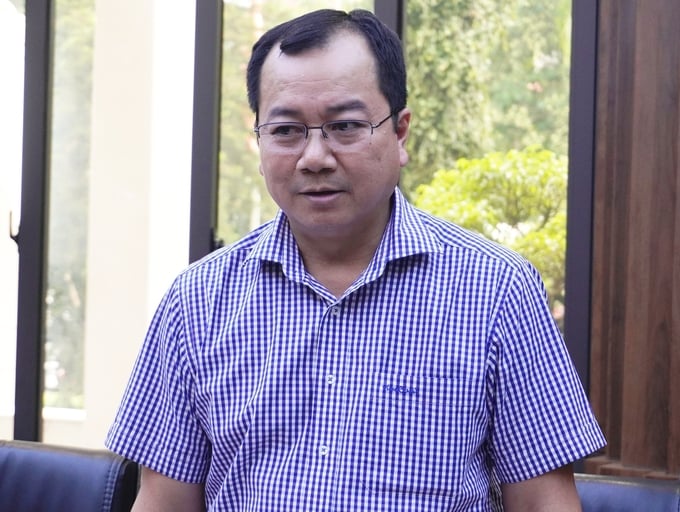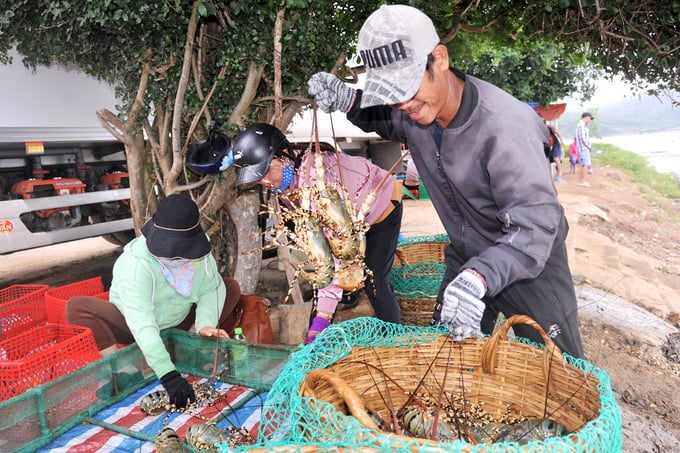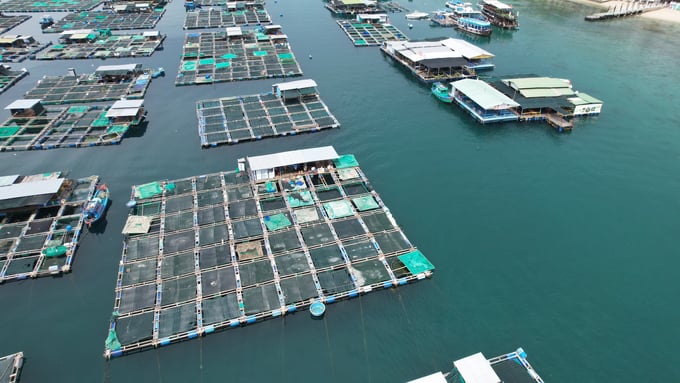May 21, 2025 | 09:38 GMT +7
May 21, 2025 | 09:38 GMT +7
Hotline: 0913.378.918
May 21, 2025 | 09:38 GMT +7
Hotline: 0913.378.918
Our country's export of tropical rock lobsters to China faces difficulties when this market requires packing facilities and farming facilities to register specific information about the farming facility. Meanwhile, most tropical rock lobsters raised in our country have not been granted a certificate of cage aquaculture facilities, so registering farming facility information is still difficult. This regulation has many consequences. Is it making it difficult for tropical rock lobsters?

Mr. Tran Dinh Luan, Director of the Department of Fisheries, said: "Currently, the whole country has about 17,200 cage farming establishments that must be registered (granted with codes)." Photo: Hong Tham.
Issuing a Certificate of cage aquaculture facility and registering information about a tropical rock lobster farming facility still has many difficulties, affecting lobster export activities, including tropical rock lobsters to China.
Therefore, to overcome the above difficulties, it is necessary to actively participate from the entire political system, from the Government, the Ministry of Natural Resources and Environment, the Ministry of Agriculture and Rural Development, localities, industry associations, and lobster farmers.
On the local side, it is necessary to carry out the assignment of marine areas urgently and at the same time, soon issue a Decree amending and supplementing several articles of Decree No. 26/2019/ND-CP dated March 8, 2019 of the Government on detailed regulations for several articles and measures to implement the Fisheries Law.
China also requires raising tropical rock lobsters, not using naturally exploited breeds (the breed must be F2 generation). Will this regulation "close the door" to the export our country's tropical rock lobsters?
China's regulations on tropical rock lobsters raised without using naturally exploited breeds (the breed must be F2 generation) will cause great difficulties in exporting tropical rock lobsters to this market.
Meanwhile, tropical rock lobsters are not on the management list of the Convention on International Trade in Endangered Species of Wild Fauna and Flora (CITES) (Notification No. 25/TB-CTVN dated February 17, 2023 on promulgation of the List of wild animal and plant species in the CITES Appendix).

Issuing Certificates of cage aquaculture facilities and registering information on spiny lobster farming facilities still have many difficulties, affecting lobster export activities, including tropical rock lobsters to China. Photo: Kim So.
On the other hand, tropical rock lobsters are on the List of permitted businesses in Vietnam according to the provisions of Appendix VIII of Decree No. 26/2019/ND-CP dated March 8, 2019, of the Government detailing several regulations and measures to implement the Fisheries Law.
Currently, tropical rock lobsters exploited from domestic waters and imported from some countries in the region have clear origins and are quality-controlled according to regulations.
From the story of tropical rock lobsters, one of our difficulties is issuing cage aquaculture certificates. Can you tell us how this issue is currently being implemented?
According to the provisions of Point b, Clause 1, Article 38 of the 2017 Fisheries Law: "Registration is required for cage aquaculture". Currently, the whole country has about 17,200 cage farming facilities that must be registered (issued with codes); issued codes to 621 establishments (accounting for 3.6%).
Issuing Certificates of cage aquaculture establishments is difficult because most cage aquaculture establishments have not been assigned or leased land or sea areas for aquaculture.
As he shared, localities need to carry out sea area allocation urgently. However, many localities "complain" that there is no precise planning, so there is no basis for assigning sea areas or leasing contracts for land use rights and sea areas to farmers. So where does the real problem lie, sir?
According to the provisions of Article 43 of the Law on Fisheries, "The allocation, lease, and recovery of land for aquaculture shall comply with the provisions of land law"; Article 44 of the Law on Fisheries, "The allocation of marine areas for aquaculture must be based on national marine spatial planning, provincial planning and regulations of law on the sea, ensuring national defense and security".
However, many localities have not yet allocated or leased land and sea areas for aquaculture. Therefore, the issuance of codes for cage aquaculture establishments is difficult due to not meeting all the components of the application dossier for issuance of codes as prescribed in Point b, Clause 2, Article 36 of Decree No. 26/2019/ND-CP dated March 8, 2019, of the Government detailing several articles and measures to implement the Fisheries Law.
According to you, facing such difficulties in issuing Certificates of cage aquaculture establishments, what do we need to do to overcome them?
When implementing the Fisheries Law and its guiding documents, the Department of Fisheries promptly participated when detecting shortcomings, inadequacies, and difficulties in implementing the Certificate of Cage Aquaculture establishments. Advise the Ministry of Agriculture and Rural Development to submit to the Prime Minister for promulgation Decision No. 2177/QD-TTg dated December 23, 2021, on approving a plan to reduce and simplify regulations related to business activities within the scope of business management activities of the Ministry of Agriculture and Rural Development, specifically:
Abolish the dossier components specified in Point b, Clause 2, Article 36 of Decree No. 26/2019/ND-CP dated March 8, 2019, of the Government detailing many articles and measures to implement the Fisheries Law "Certificate of land use rights when allocated or leased land for aquaculture or license to operate aquaculture within the scope of protection of irrigation or hydroelectric works or decision to allocate sea area or lease contract of land use rights, marine area for aquaculture".
At the same time, the Ministry of Agriculture and Rural Development also issued Report No. 9202/TTr-BNN-TCTS dated December 31, 2021, on submitting to the Government a Draft Decree amending and supplementing some articles of Decree No. 26/ 2019/ND-CP; On August 30, 2023, the Ministry of Agriculture and Rural Development issued report No. 6022/BC-BNN-TS, reporting to the Prime Minister on the study and completion of the Draft Decree amending and supplementing some articles of Decree 26/2019/ND-CP, which contains the proposal to consider and abolish the dossier components specified in Point b, Clause 2, Article 36 of Decree No. 26/2019/ND-CP.
Returning to the story of tropical rock lobsters, what is the solution to "open up" exports in the near future, sir?
Regarding the Chinese market, Vietnam needs to clarify with the relevant Chinese authorities whether such new regulations are consistent with the "CITES Convention" and regulations on free trade according to the Organization. World trade (WTO) or not?
We will also negotiate with "friends" to remove problems caused by "new regulations from the Chinese side". If the legal basis is sufficient, we can apply the trade defense measures according to international regulations.

Many localities have not yet allocated or leased land and sea areas for aquaculture. Photo: Thanh Cuong.
For domestic production, guide, propagate and mobilize farmers to register for cage farming according to Article 36 of Decree 26/2019/ND-CP dated March 8, 2019; Organize the review and arrangement of suitable cages and according to the approved local plan. Promptly advise the Provincial People's Committee to remove difficulties in the work of "Confirming registration of aquaculture in cages, rafts/key aquaculture species"; Immediate recommendations are "reducing the farming of tropical rock lobsters, increasing the farming of green lobsters".
Strengthen control of regulations on farming facility conditions and possession of lobster breed origins (direction of the Ministry of Agriculture and Rural Development on lobster breed management. Vietnam Technical Regulation No. 02-34:2021/BNNPTNT, Document 6361/BNN-TY dated September 11, 2023, on preventing smuggling, trading, and transportation of lobster seeds, the direction of the Department of Fisheries in Document 1087/TS-GTATS dated October 17, 2023 on Strengthening the management and quality control of lobster breeds and Documents 613/TS-NTTS dated August 16, 2023, 1253/TS-NTTS dated November 7, 2023 on strengthening aquaculture management in the South Central Sea and lobster).
Strictly implement regulations prohibiting the exploitation of tropical rock lobsters (Panulirus ornatus) from April 1 to May 30 every year and strictly handle violations (Appendix II, Decree 26/2019/ND-CP). Strengthen research and international cooperation in studying the artificial reproduction of lobsters for proactive production.
Review and research forecasts of domestic and export market demand to organize reasonable production of tropical rock lobsters. At the same time, it strengthens communication to promote consumption in the domestic market.
Soon, construct a lobster traceability database to serve management, traceability, and information transparency and create favorable conditions for export.
For other consumer markets, proactively organize market expansion and trade promotion to potential countries such as Japan, EU, Korea, Hong Kong, Taiwan, Thailand, Philippines...; Research to create value-added products made from lobsters in general and tropical rock lobsters in particular.
Thank you so much!
Translated by Tuan Huy

(VAN) Dong Thap farmers attained an average profit margin of 64% during the summer-autumn 2024 crop (first season), while An Giang and Kien Giang farmers followed with 56% and 54%, respectively.

(VAN) As a doctoral student doing research on renewable energy and electrification at Harvard University, the author shares his musings on electricity, nature, and countryside memories.

(VAN) The decree on Extended Producer Responsibility (EPR) ensures transparent management and disbursement of support funds, avoiding the creation of a “give-and-take” mechanism.

(VAN) Hue City rigorously enforces regulations regarding marine fishing and resource exploitation, with a particular emphasis on the monitoring of fishing vessels to prevent illegal, unreported, and unregulated (IUU) fishing.

(VAN) Hanoi People's Committee has issued a plan on reducing greenhouse gas emissions in the waste management sector with 2030 vision.

(VAN) Vietnam's draft amendment to Decree No. 156 proposes a mechanism for medicinal herb farming under forest canopies, linking economic development to population retention and the sustainable protection and development of forests.

(VAN) In reality, many craft village models combined with tourism in Son La have proven effective, bringing significant economic benefits to rural communities.